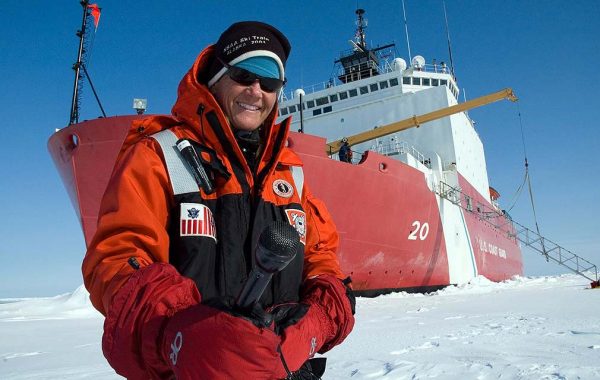
Elizabeth Arnold ’82
A former NPR journalist reports from an untamed land stressed by climate change
Elizabeth Arnold ’82 recently made final edits to her video interview with Ivan, a retired Russian reindeer herder who grew up following the rangy animals’ migratory patterns and knows firsthand the effect that climate change is having on them.
While Ivan recalls herds of 200,000 reindeer, for instance, there are now around 2,000. Nevertheless, he returns each summer to the tundra where his mother raised him. Going back is “in the blood,” he said.
With a three-year grant from the National Park Service, Arnold reports for ArcticProfiles.com, whose goal is to produce intimate portraits of people in the Arctic — specifically, its Beringia region, which includes parts of Alaska, Russia, and Canada that share similar geology because of their former link at the Bering Land Bridge.
“Everybody’s looking to the North right now because of climate change,” said Arnold, a journalism professor at the University of Alaska in Anchorage. “These stories will help people in the lower 48 know more about folks up here. People think we’re up here in igloos.”
Arnold’s work for the site also includes Soundings, a series of three- to four-minute stories about The Bering Sea Project, a National Science Foundation–funded study in which more than 100 scientists are looking at the impact of climate change on dynamic sea ice cover. One of her audio segments explores how disappearing ice changes walrus behavior. Massive mammals that once floated on sea ice all summer, the walruses now pack onto shorelines. In more confined spaces, they can trample smaller walruses and have a harder time finding food.
Finding science stories sent Arnold on a Russian icebreaker last summer to Wrangel Island, in the Arctic Circle above Russia. There she interviewed Ivan and other reindeer herders, as well as scientists studying everything from Arctic plants to musk-oxen. Hearing and telling these stories keeps Arnold in this often-raw land.
“Having been to the North Pole a couple of times, I’ve seen how fast it’s changing,” said Arnold. “Putting a face on it and helping people understand has become a passion.”
Arnold has been back in the 49th state since 2003, telling stories of Northern people and changes in local climates. She cut her teeth there as a fledgling reporter before moving to Washington, D.C., to be a national political correspondent for National Public Radio. Alaska beckoned, she said, because it is “a wild place, full of opportunity.”
These days, she interviews scientists more often than heads of state, and she feels lucky that Alaska, given the need to reach residents in remote towns, still emphasizes great radio projects: “My heart is in radio.”
— Catherine Arnold






